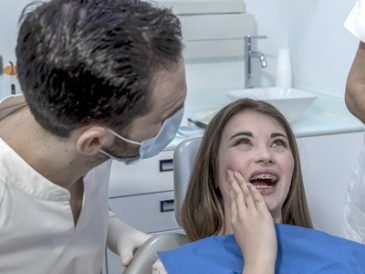Tooth decay, often called dental caries or cavities, is a prevalent dental issue that affects people of all ages. It occurs when tooth enamel is damaged, leading to cavities. But what exactly causes tooth decay?
The Culprit Behind Tooth Decay
Tooth decay primarily results from the interaction between sugar and bacteria in the mouth. When you consume sugary foods or drinks, the bacteria in your mouth feast on these sugars and produce acids. Over time, these acids can wear down the enamel, the hard outer layer of your teeth, leading to cavities.
Recognizing the Signs
Identifying cavities early can make treatment easier and prevent further decay. Common signs of tooth decay include:
-
Tooth sensitivity to hot, cold, or sweet stimuli
-
Visible pits or holes in your teeth
-
Toothache or pain while chewing
-
Discoloration or dark spots on your teeth
Why Are Dental Cleanings Crucial
Regular dental cleanings are a crucial part of oral health care and play a significant role in preventing tooth decay. But how exactly do these cleanings help keep your teeth healthy?
1. Removal of Plaque and Tartar
Even with regular brushing and flossing, it’s challenging to eliminate all the plaque from your teeth. Plaque, a sticky film of bacteria, can harden into tartar if not removed. To prevent tooth decay with dental cleanings, dental hygienists use special tools to remove both plaque and tartar, significantly reducing the risk of cavities.
2. Preventing Gum Disease
Gum disease, caused by the same bacteria that cause tooth decay, can also be avoided through regular cleanings. Removing plaque and tartar helps protect not just your teeth but your gums, ensuring a healthier mouth overall.
Fluoride Treatments and Their Benefits
Alongside cleanings, you may also receive fluoride treatments at the dentist. Fluoride strengthens the enamel and makes it more resistant to acid attacks from plaque bacteria and sugars, providing another layer of defense against cavities.
Dental Hygiene Habits
Dental cleanings aren’t just about cleaning your teeth. They’re also an excellent opportunity for your dentist to examine your oral hygiene habits. Are you brushing and flossing correctly? Should you be using a different toothbrush or mouthwash? Regular cleanings allow you to get personalized advice tailored to your specific needs.
The Importance of Regular Dental Visits
Why Twice a Year?
You’ve likely heard that visiting the dentist twice a year is a good rule of thumb, but have you ever wondered why that frequency is recommended?
Early Detection of Potential Issues
By seeing your dentist regularly, you’re giving them the opportunity to spot potential issues before they become serious. This could mean detecting cavities in their early stages or noticing signs of gum disease before it advances.
Building a Relationship with Your Dentist
Regular visits help you establish a rapport with your dentist, making it easier for them to understand your unique dental needs. This relationship can lead to more personalized care and better overall outcomes for your oral health.
When to Consider Additional Care
Even with regular cleanings, some individuals may require additional care to prevent tooth decay. This could be due to genetic factors, lifestyle choices, or underlying health conditions.
1. Considering Dental Sealants
For those prone to cavities, dental sealants might be an excellent option. These protective coatings are applied to the chewing surfaces of the back teeth, where cavities most commonly occur. Sealants create a barrier that protects enamel from plaque and acids, offering additional protection against decay.
2. Exploring Digital Dental X-rays
Technology has significantly evolved in the dental field, offering new ways to ensure your teeth remain healthy. Digital dental X-rays in Manchester, NH, serve as a great example of utilizing innovative technology to detect decay and other issues that may not be visible during a regular dental exam. They are quicker, safer, and provide a detailed look at the teeth and surrounding structures.
3. Using Mouth Rinses and Topical Fluoride
Sometimes, adding specific products to your oral care routine can be beneficial. Your dentist might recommend an antimicrobial mouth rinse or a topical fluoride treatment that you can use at home to help prevent cavities.
Brushing and Flossing Are Not Enough
While brushing twice a day and flossing daily are fundamental practices for good oral hygiene, they may not be enough on their own to completely prevent cavities.
The Limits of At-Home Dental Care
Homecare effectively removes surface plaque and food particles, but it can’t necessarily remove all plaque and tartar. That’s why professional cleanings are essential. They reach the areas that toothbrushes and dental floss might miss.
Check Your Technique
Your dentist or hygienist can also help you improve your at-home dental care techniques, ensuring you’re doing everything possible to keep your teeth healthy. Sometimes, a simple adjustment in how you brush or floss can make a significant difference.
Incorporating Healthy Habits
In addition to regular dental visits and good at-home care, there are several other habits you can adopt to help combat tooth decay.
1. Eating a Balanced Diet
What you eat plays a crucial role in maintaining dental health. Aim to maintain a balanced diet rich in vitamins and minerals that strengthen your teeth.
-
Include plenty of fruits and vegetables
-
Limit sugary snacks and beverages
-
Choose water over sugary drinks
2. The Sugar Connection
Sugary foods and drinks are one of the primary culprits of tooth decay. By minimizing your sugar intake and watching what you eat, you’re doing your teeth a huge favor.
3. Avoiding Tobacco Products
Tobacco products can lead to a variety of oral health issues, including an increased risk of tooth decay. By avoiding these products, you can help ensure a healthier mouth.
Promoting Dental Health in Children
Good dental habits should start early. Teaching your children about the importance of oral hygiene can set them up for a lifetime of healthy teeth.
Start Young for Lasting Habits
-
Introduce regular brushing habits as soon as your child’s first tooth appears.
-
Make dental care a family activity.
-
Encourage regular dental visits to build comfort and familiarity with the dentist.
Consider Dental Care Specific to Children
Children sometimes need additional care, such as dental sealants or fluoride treatments. Your dentist can recommend the best options for your child based on their individual needs.
Your Next Steps Toward Healthier Teeth
By now, you hopefully have a deeper understanding of how regular dental cleanings can help prevent tooth decay. Not only do they protect your teeth, but they also offer a chance to learn more about your overall oral health. When considering dental care options, particularly if you’re looking for a professional service, you might want to explore a dentist in Manchester, New Hampshire or another location that fits your needs.
Final Thoughts
Ensuring you maintain regular appointments with your dentist is a proactive way to keep tooth decay at bay and maintain a healthy smile. By incorporating regular cleanings, good at-home care, and healthy lifestyle choices, you’re taking significant steps toward preventing tooth decay and promoting a lifetime of dental health.





